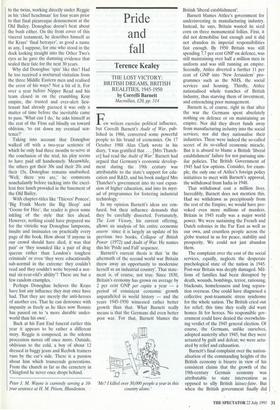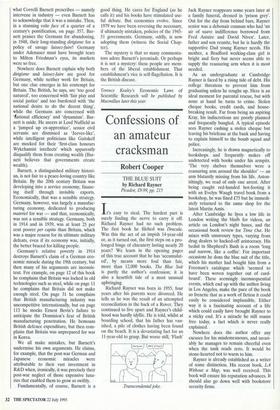Pride and fall
Terence Kealey
THE LOST VICTORY: BRITISH DREAMS, BRITISH REALITIES, 1945-1950 by Correlli Barnett Macmillan, £20, pp. 514 Few writers exercise political influence, but Correlli Barnett's Audit of War, pub- lished in 1986, converted some powerful people to his brand of economics. On 17 October 1988 Alan Clark wrote in his diary, 'I was gratified that. . . [Mrs Thatch- er] had read the Audit of War.' Barnett had argued that Germany's economic develop- ment during the 19th century was attributable to the state's support for edu- cation and R&D, and his book nudged Mrs Thatcher's government into its vast expan- sion of higher education, and into its myri- ad of programmes for fostering industrial technology.
In my opinion Barnett's ideas are cdn- fused, but their influence demands that they be carefully dissected. Fortunately, The Lost Victory, his current offering, allows an analysis of his entire economic oeuvre since it is largely an update of his previous two books, Collapse of British Power (1972) and Audit of War. He names this his 'Pride and Fall' sequence.
Barnett's current thesis is that 'in the aftermath of the second world war Britain threw away an opportunity to modernise herself as an industrial country'. That state- ment is, of course, not true. Since 1830, Britain's economy has grown on average by 2 per cent GNP, per capita a year — a period of consistent economic growth unparalleled in world history — and the years 1945-1950 witnessed rather better growth than that. What Barnett really means is that the Germans did even better post war. For that, Barnett blames the 'Me? I killed over 30,000 people a year in this country alone.' British 'liberal establishment'.
Barnett blames Attlee's government for underinvesting in manufacturing industry.
Instead, he says, Britain wasted its seed corn on three monumental follies. First, it did not demobilise fast enough and it did not 'abandon its imperial responsibilities fast enough. By 1950 Britain was still spending 7.7 per cent GNP on defence, was still maintaining over half a million men in uniform and was still running an empire.
Secondly, Attlee diverted a further 11 per cent of GNP into 'New • Jerusalem' pro- grammes such as the NHS, the social services and housing. Thirdly, Attlee nationalised whole tranches of British industry, thus starving them of investment, and entrenching poor management.
Barnett is, of course, right in that after the war the Germans spent absolutely nothing on defence or on maintaining an empire. Nor did they divert funds away from manufacturing industry into the social services, nor did they nationalise their industries. These were indeed the so-called secret of its so-called economic miracle.
But it is absurd to blame a British 'liberal establishment' failure for not pursuing sim- ilar policies. The British Government of 1945 had few options. Consider, for exam- ple, the only one of Attlee's foreign policy initiatives to meet with Barnett's approval, the withdrawal from India in 1948.
That withdrawal cost a million lives. Incredibly, Barnett does not mention this.
Had we withdrawn as precipitously from the rest of the Empire, we would have pro- voked even more millions of murders.
Britain in 1945 really was a major world power. We were sustaining the French and Dutch colonies in the Far East as well as our own, and countless people across the globe trusted in us for peace, stability and prosperity.. We could not just abandon them.
The complaint over the cost of the social services, equally, neglects the desperate psychological state of the nation in .1945.
Post-war Britain was deeply damaged. Mil- lions of families had been disrupted by death, wounds, bombings, terror, rationing, blackouts, homelessness and long separa- tion overseas. One could have diagnosed a collective post-traumatic stress syndrome for the whole nation. The British cried Out for relief; this time they really did want homes fit for heroes. No responsible gov- ernment could have denied the overwhelm- ing verdict of the 1945 general election. Of course, the Germans, unlike ourselves, adopted austerity after 1945, but they were actuated by guilt and defeat; we were actu- ated by relief and exhaustion.
Barnett's final complaint over the nation- • alisation of the commanding heights of the British economy is. bizarre in view of his consistent claims that the growth of the 19th-century German economy was attributable to state intervention as opposed to silly British laissez-faire. But when the British government finally did what Correlli Barnett prescribes — namely intervene in industry — even Barnett has to acknowledge that it was a mistake. Then, in a stunning volte face of a quarter of a century's pontification, on page 357, Bar- nett praises the Germans for abandoning, in 1948, their long-standing dirigisme for a policy of savage laissez-faire! Germany under Adenauer must have brought tears to Milton Ffiedman's eyes, its markets were so free.
Nowhere does Barnett explain why both dirigisme and laissez-faire are good for Germany, while neither work for Britain, but one clue emerges in his contempt for Britain. The British, he says, are `too good natured', too concerned with `fair play and social justice' and too burdened with `the national desire to do the decent thing', while the Germans are concerned with 'national efficiency' and `dynamism'. Bar- nett is snide. He sneers at Lord Nuffield as a 'jumped up ex-apprentice', senior civil servants are dismissed as leeves-like', while intelligent politicians like Gaitskell are mocked for their 'first-class honours Wykehamist intellects' which apparently disqualify them from creating wealth (Bar- nett believes that governments create wealth).
Barnett, a distinguished military histori- an, is not fair to a peace-loving country like Britain. By the 20th century Britain was developing into a service economy, financ- ing itself through invisible exports. Economically, that was a sensible strategy. Germany, however, was largely a manufac- turing economy, dedicated to producing materiel for war — and that, economically, was not a sensible strategy. Germany, both in 1914 and in 1939, was at least 25 per cent poorer per capita than Britain, which was a major reason for its ultimate military defeats, even if its economy was, initially, the better braced for killing people.
Germany's relative poverty in 1914 destroys Barnett's claim of a German eco- nomic miracle during the 19th century, but then many of his arguments are inconsis- tent. For example, on page 12 of this book he complains that Britain was locked in old technologies such as steel, while on page 11 he complains that Britain did not make enough steel. On page 31 he complains that British manufacturing industry was uncompetitive internationally, but on page 113 he mocks Ernest Bevin's failure to anticipate the Dominion's fear of British manufacturing penetration. He bemoans British defence expenditure, but then com- plains that Britain was unprepared for war in Korea.
We all make mistakes, but Barnett's undermine his own arguments. He claims, for example, that the post-war German and Japanese economic miracles were attributable to their vast investment in R&D when, ironically, it was precisely their post-war neglect of those expensive luxu- ries that enabled them to grow so swiftly.
Fundamentally, of course, Barnett is a good thing. He cares for England (as he calls it) and his books have stimulated use- ful debate. But economies evolve. Since 1979 we have been reversing the necessary, if ultimately mistaken, policies of the 1945- 51 governments. Germany, oddly, is now adopting them (witness the Social Chap- ter).
The mystery is that so many commenta- tors adore Barnett's jeremiads. Or perhaps it is not a mystery: these people are mem- bers of the liberal establishment. That establishment's vice is self-flagellation. It is the British disease.
Terence Kealey's Economic Laws of Scientific Research will be published by Macmillan later this year.



















































 Previous page
Previous page